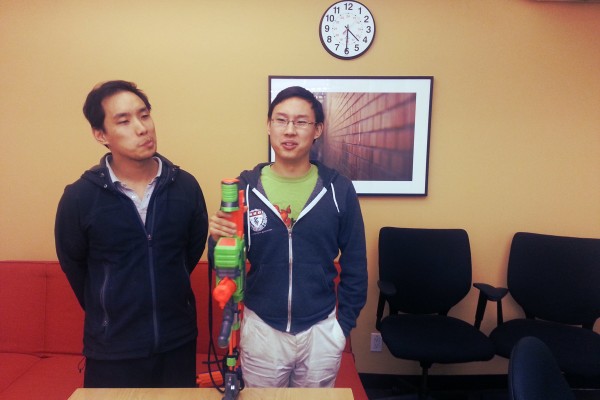
Q: Let’s start with Daniel. Who are you and why are you here?
Daniel: Well, I’m not quite sure where to start; I did my undergrad in computer science and statistics, eventually spending a bunch of time in computer graphics.
Q: So Floored was a logical place for you to work.
Daniel: Apparently investment banking made more sense. And then management consulting. After three years of Excel, Dave (Eisenberg, Floored’s co-founder and CEO) called me. At the time, the company only had a few employees and he was handling everything not related to software development on his own. He was looking for help and I also had a (diminishing) technical background; it’s hard to say who tricked whom into coming to Floored.
I started out taking a horizontal slice of Dave’s work – a bit of sales, a bit of recruiting; the list goes on – but the role quickly turned into a project-based one. As a start-up, there are so many pain points, so I’d go off to explore solutions before we were able to find more capable people. Today, I spend most of my time thinking about our product offerings.
Q: So you’re pretty much like this guy?
Daniel: Left or the right?
Q: Moving on. Michael, what’s your deal? Word on the street is that you’re Daniel’s brother – do you deny it?
Michael: No, it’s true. I’m an undergrad in comp sci and economics. I’m interning on the product management team this summer, but somehow got roped into also prototyping the ideas we want to try.
Q: So did you just want to work here to bond with your brother?
Michael: No, what interested me about Floored is… let’s put it this way: I play a lot of games, and this is a way to do game stuff but with a serious purpose. I’ve got an abiding interest in 3D graphics and 3D visualization. For me working at Floored is an excuse to do cool work that doesn’t just allow teens to kill each other virtually. Plus I get to work with the Oculus, which is awesome.
Q: Daniel, I never really asked, what got you interested in Floored when Dave called you up?
Daniel: To be honest, my initial reaction was ‘why do even people care about 3D’? As a non-gamer, I certainly didn’t. But as I thought about it, I realized that if you make 3D content as accessible as 2D (photography, for example), there’s just no way 3D would not be just as if not more important than 2D media. It’s very hard to disagree with this (possibly trivial) statement, so we have a clear mission, but we’re not exactly sure how we’ll get there yet. That’s exciting.
Michael: It’s an interesting time, because we may already have half of the equation. We have an idea for how we’ll consume 3D content, with headsets like Oculus and Morpheus. We know what unique experiences that will bring. But we’re not nearly as far along producing 3D content in an ultra low-cost way.
VR is truly unlike any other medium we’ve experienced because for the first time, we have a natively 3D experience. Viewing 3D on a flat screen doesn’t even come close; in fact, VR is so convincing that it hijacks your sensory system into acting in accordance with a completely fabricated world. [Michael] Abrash talks about this idea of presence.
Q: Presence?
Michael: The idea is if the latency is low enough and refresh rate is high enough, you forget that you’re standing in a room wearing a headset. For example, if you’re using the Oculus and there’s a low overhang, you’ll instinctively duck. That’s incredible. It’s not just the same content packaged in a different way, it’s genuinely a new medium that offers a set of experiences that we’ve never had.
Q: Wow, that’s is amazing. Anything else you guys would like to add before we wrap this up? Any good childhood stories?
Daniel: Well, there’s the hamster story… might not be appropriate here. Suffice it to say that at an early age, we learned a lot about birth, murder, adultery, incest, and death.
Michael: So much death. It wasn’t our fault though.
Q: Uh huh. That sounds like a story for next time.